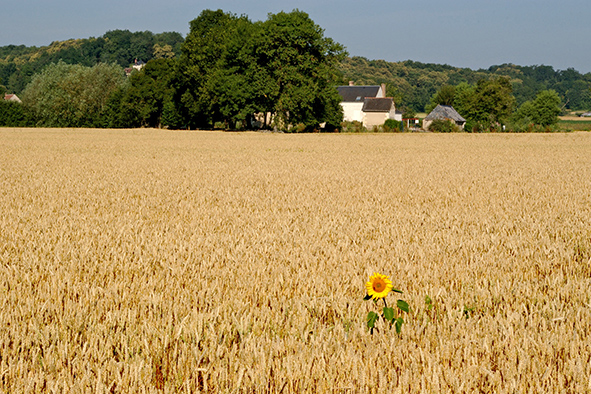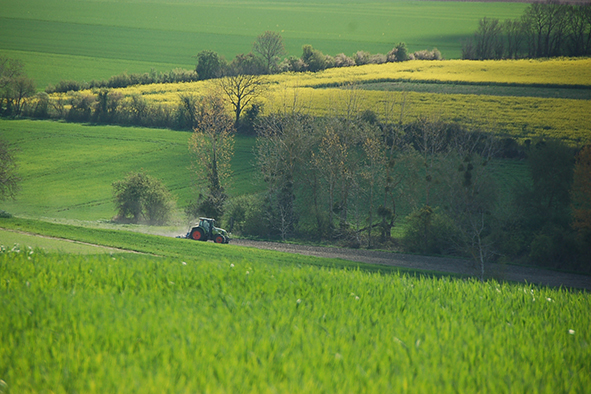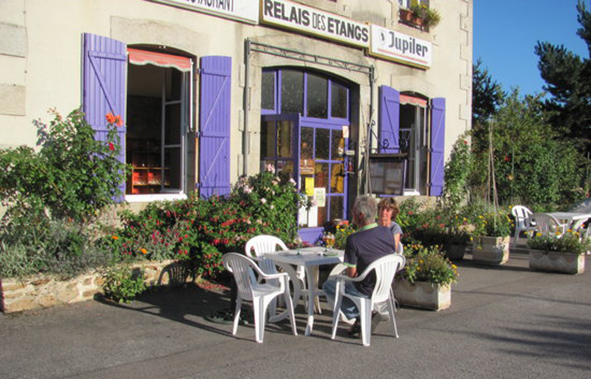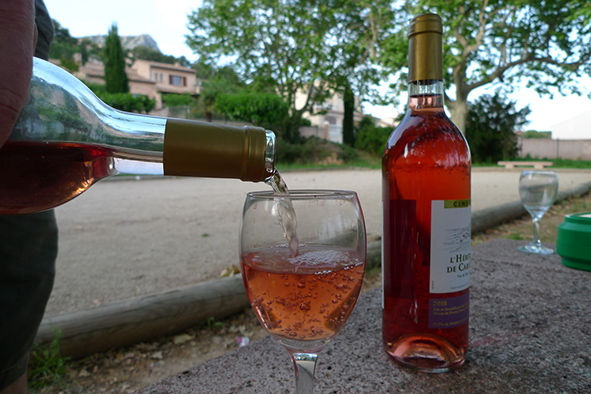La France Profonde is another country buried in France’s rural heartland, where values (and food) that predate the revolution still thrive. Previously it was almost impossible to reach this part of the country on a budget, but as the sharing economy makes it easier to stray from established transport routes, the times are changing.

French car, French village (Photo: Ernst Moekis via Flickr)
It’s not always advisable to visit the places of your old adventures; this is even more the case when you have other people in tow.
“Why aren’t we on the motorway anymore?” my friend calls from his cramped position in the back of the Espace, jarred awake by the sudden swerves of the French D road onto which I’d turned.
This question seems to alert my other five passengers that we have indeed left the motorway; that I am taking… a detour.
“I thought we could drop by Nantiat for lunch,” I say, in a way that is probably a little too casual.
“Nantiat?” someone else says, “what’s a Nantiat?”
“Isn’t that that town you got abducted by those guys in?” asks my girlfriend, riding shotgun. “That night you’re always going on about, when you were trying to get to that wedding?”
“Look; first, I didn’t get abducted,” I say, keen to gloss over that part of the story. “Second, I went to an amazing restaurant. Best meal of my life… I thought it’d be a good place to stop for lunch.”
There is a general checking of watches.
“Chris, it’s two o’clock…”
“So?”
“We’re in the French countryside…”
“I know; great, isn’t it!”
“They will have stopped serving.”
“Not necessarily,” I say brightly, “and trust me, if they haven’t, it’ll be more than worth our time.”
“OK,” one grudging voice sounds, “how far out of our way is it?”
Ah, the question I’d hoped might not be asked.
“I dunno,” I breeze, “forty kilometres…”

Some kind of metaphor (Photo: Daniel Jolivet via Flickr)
Organised Hitching
It had started with me on the pavement outside Caen railway station on a brilliantly sunny June morning, waiting on a lift from a stranger. I had a wedding to get to on the other side of France, but last-minute train tickets were pushing 200 euros. I’d needed another option.
“Chris?” a battered Peugeot 106 pulled up alongside me, window down, and its driver, a birdlike woman in her 30s called out my name.
“Uh, oui, c’est moi…” I said – how had she recognised me?
“Bon. Je suis Audrey,” she opened the door. “Alors, Je peux vous aider avec vos valises?”
Ah, she’d seen my travelling bags; there clearly wasn’t anyone else outside the station who looked quite so in need of a lift.
“Sorry,” I apologised in French, “I’m new to this car sharing thing.”
“In fact, though, we are quite full already,” Audrey replied, all business. “Maybe you must sit with your bag in the back?”
“Sure,” I smiled, then saw that the car was almost full: three young women, one in the passenger seat and two in the back. Each offered me a weary grin, clearly not overly thrilled at the prospect of a fourth passenger.
“Don’t worry, they’re only riding a short way,” Audrey said. “Less than three hours. Alors, on’y va…”
It amazes me now that before that week in 2014 I had not even heard of the French car sharing website BlaBla Car, let alone used it. The concept is simple: if someone is making a journey they put it up on the site, and for a small fee to cover petrol costs, one can buy a seat in their car. It’s organised hitchhiking, essentially, but has scythed through the costs of moving around France and opened a whole other side of the country that was previously almost inaccessible to the budget traveller.
I didn’t talk much on that first part of the journey. My French is not up to following four people chatting at once. Mainly, I just stared at the bland unravelling scenery of motorway France: the fields of rape seed and corn, the grain silos, and the occasional lonely farm house buttressed against the flow of time.
Only when it was just Audrey and me in the car did we start speaking. It was late afternoon by then and the sun had just begun its leisurely summer decline. To avoid tolls, Audrey had taken us off the motorway, and we were swerving our way into a rolling patchwork of smaller scale agriculture, cutting through stone villages, the café terraces of which were beginning to fill with old men, swilling beaded half pints and thimble sized glasses of red wine.
“This is the Poitou-Charentes region,” Audrey said. “It’s where I was born.”
“It’s beautiful,” I said.
“It has a long coastline on the Atlantic, so Poitou-Charentes is most known for its fish and for its oysters. But where I grew up was inland… We ate pork and white beans and farci poitevin, like a pâté of herbs.” Audrey seemed to drift off for a moment: “The taste of my childhood.”
“There is another France,” she continued, “one that I don’t think many tourists see. One that you don’t find in the cities, that is difficult to reach by train. We call it La France Profonde, Deep France. It is still a peasant culture; very Catholic, very connected to the land. It’s where French cooking does not mean just steak frites, you know. Every department has its own local specialities that go far, far back in time.”
Naturally, I wanted to know how to find this magic place.
Audrey laughed. “It’s here. We are in it now,” she said. “You can just ask me to stop the car and let you out, if you wish…”
I explained how, unfortunately, I had a wedding to get to, but that also effectively just being let out of her car at a random spot was already part of my plan.

A scene repeated throughout La France Profonde (Photo: Bob via Flickr)
It’s a familiar sensation for me: I’ve co-opted one or more people into following some quixotic end, the windmills getting closer, and it becomes patently obvious that they’re not giants; that they probably aren’t even all that impressive as windmills.
So far, though, so good. The country on the approach to Nantiat is more lush and beautiful than I remember. Deep green, shaggy trees, shimmering like cheerleaders’ pompoms in the summer wind, and rolling fields of swaying corn and sunflowers still brilliantly yellow for so late in the year.
Even so with every unnecessary mile we pass, with every achingly quaint small town that reveals itself firmly as not Nantiat I can feel the discontent behind me growing; can sense the rumblings of mutiny afoot.
A Staging Post
My problem was, that great though BlaBla Car is, it’s not always the most predictable, not to say precise, transport service. That day, there had been no journeys directly between Caen and where the wedding was taking place, so I’d had to compromise.
I’d looked for journeys that would at least take me closer to my final destination, to towns that I could stay the night in with cheap camping and local transport connections with which I could finish my trip. Hence, Nantiat: the railhead of a branch line about thirty miles north of Limoges, a non-place as far as tourism is concerned.
We arrived at the town’s campsite at the dénouement of a lingering sunset. The shaggy green foliage that surrounded us was soaked in a brilliant orange striped by pools of shadow-black, giving it the aspect of some vast tiger curled in sleep beside the road into town.
A slack iron chain hung across the camp’s entrance, a sign on it explaining that camping season did not begin for another week. That was about it for security, however, so I assured Audrey that I did not need a lift to a hotel, thanked, said goodbye, then crossed into the empty field.
It was a windless evening, the air thick with the throb of cicadas and that inimitable smell of the rural south – a perfume of grasses, dust, and lazy heat.
It was only once I’d made camp that I realised I didn’t have any food. And to arrive at such a sunset without a cool white wine to toast it with was a frustrating inch from perfection.
I resolved to head into town.
*** ***
Nantiat: it’s only when we arrive in the Espace that I recall how unpleasant and ugly the actual town is. Surrounded by beautiful nature and quaint satellites it may be, but architecture here is modern and unremarkable.
It’s the kind of place that makes you instantly glad you weren’t born there. My friends who have remained grudgingly silent until this point, suddenly can’t contain themselves.
“This is it?”
“This is what we went on the forty-mile detour for?”
“Kilometre.”
“What?”
“Forty-kilometre.”
“Chris, I don’t care… Why have you taken us here?”
And now it’s coming back: the ugliness of Nantiat was all part of my experience; it made what I found there all the more remarkable.

The Relais des Etangs (Photo: Farehamvoyager via TripAdvisor)
Going Deep
Time itself seemed on pause as I walked into Nantiat centre. The town felt abandoned: streets of shuttered houses, forgotten cars, closed shops. Even the main square was empty of life, just a few fallen leaves and scraps of rubbish motionless in the no-wind. The only movement at all was a flickering green cross of a pharmacy sign, advertising nothing to no one: the pharmacy, too, was closed.
My hopes of finding a place to eat and drink dwindled, not to mention that the town had none of the “France Profonde” charm that I hoped to discover.
Still, I persisted. I had nothing else to do. Nantiat, however, was hardly more than a village, and before I knew it the ugly modern buildings had begun to thin, and I found myself on a gentle incline toward the ridge which marked town’s end.
There was a building that crested the ridge which kept me going: a tall, box-like structure, maybe 18th Century. It looked – my heart leapt – like a coaching inn.
I arrived to find myself blissfully proven right: it was a coaching inn, Le Relais des Etangs. Outside, were the first people I had seen in Nantiat: two men who looked to me the archetype of French peasants, representatives of some older order, tawny skinned and thick featured, as though moulded from the dirt of the surrounding fields.
One was perched on the edge of a flower pot, the other stood. Both were smoking hand-rolled cigarettes, gaze focused on the middle distance, locked in a profoundly masculine silence. To talk to them felt like trying to interact with a photograph. Nevertheless…
“Bonsoir,” I said, “La cuisine ici, c’est encore ouvert?” – Is the kitchen here still open?
They stared at me in mute incomprehension. Was it my accent? Perhaps my French was not adjusted enough to the local patois to be understood.
“Le restaurant du Relais,” I tried again, pointing now to the building behind them. “C’est ouvert?”
The larger of the two, looking awkward, removed the cigarette from his oyster eating lips.
“Parlez…” he began in an accent that was almost impenetrably thick. “… English?”
“Pardon?” I said, sure I must have heard wrong.
“Do you speak English?” the other said in a voice straight from the British midlands. “Us, no French…”
I’ve never experienced as profound a volte face; my entire perception of where I was shattered in two sentences.
It was only some consolation, when at last I managed to explain that I was English, the two men – who, it was now clear, were not French peasants – seemed almost as surprised as me.
They were from Northampton, they said, here with a bunch of mates on a fishing holiday, staying at a gîte down the road. All of them were inside still eating if I wanted to join. The restaurant was “bloody marvellous” and that if I hurried in, yeah, I could probably get something to eat.
Of course, I agreed to join them, though did my best to leave any preconceptions about where I was at the door. I’d been letting my imagination and my conversation with Audrey get the better of me. I hadn’t drifted into some idyll of France’s rural past, but rather had just walked through a fairly ordinary countryside town during a nice sunset.
Inside Le Relais des Etangs, however, La France Profonde fought back. Hard.
The reception bar was a bottleneck of dust and history. A whole wall served as a shrine to Serge Gainsborough, covered in black and white photographs of the icon; another displayed an entire dining set of decorative plates. The bar itself was too high to serve from, its zinc surface a muddle of defunct ashtrays, beer mats, and Ricard branded water jugs. Behind, as well as bottle upon bottle of magic looking wines was a display of slowly fossilising liquors, cobwebbed, medicinal, and unnamed.
“Monsieur…” the waitress – short, curly haired, stern – bustled up to me, her manner demanding that I justify my presence in her restaurant.
I repeated my question as to whether the kitchen was still serving and she sucked through her teeth, which is French for “No, but for you, at our massive personal inconvenience, we’ll make an exception.”
“I will ask,” she said, then demanded if I would like a drink.
“Do you have beer?”
“Of course, sir,” she said with a withering look.
“I’ll have a beer then.”
Beer in hand, I walked to the dining area, glimpsing into the kitchen as I went – a kind of artist’s studio revealed itself to me. Only instead of paint boxes were smouldering steel pots, instead of brushes diamond sharp knives; it was a chaotic workhouse in which masterpieces are made; and there in the centre of it all, the chef, a portrait of misunderstood genius, old, tired, his whites splotched by the raw materials of his trade, peering over wire rim glasses, boldly stirring at the contents of some bubbling cauldron, communicating with his art.
The Northampton boys – there were ten in total – were sat around the wreckage of a feast: their table becrumbed, scarred by scimitars of wine, and splashes of sauce; they welcomed me like an old friend.
My beer wasn’t even finished and they were pouring me glasses of treacly red wine, explaining all at once how they’d been coming to Nantiat for a week out of every year to fish, to escape from “the wives”. They seemed an unusual group of friends, with ages spanning from about twenty-five to sixty, and I was curious as to how they knew each other, but at the table didn’t get an opportunity to ask.

French cooking (Photo: Thomas Claveirole via Flickr)
Meanwhile, the waitress bustled in to inform me that though the kitchen had technically shut, the chef was willing to prepare for me a dish of off-cuts, if that was acceptable. I said that it very much was.
Drinking wine almost at the speed my new friends could pour it, talking and being talked to constantly, it seemed like no time before my meal arrived: a heaving dish of meats and dauphinoise potatoes. It was La France Profonde on a plate, and tasted as I imagine heaven might, though with perhaps a touch more garlic.
And I was barely halfway through this meal of rustic paradise when the cheese course arrived, like some enormously delicious science experiment, oozing and stinking, crammed with more culture than the Louvre.
But even that was not the end. As a last hurrah, each of us received a dish of delicate, bite-sized patisseries, served with a boule of buttery vanilla ice cream, under a sugar crown.
It was a phenomenal meal, made yet more so by the fact that as the digestif brandies were being distributed, Nick – the larger of the two men I’d met outside – disappeared from the table, and on his return declared the entire feast his treat. That meant for me as well, and there was no sense in trying to protest.
Staggering at last outside, sucking lung-fulls of the cooling Nantiat night, Nick slung his arm across my shoulders.
“So,” he said, “you coming back to ours to watch the game?”
*** ***
Nantiat is bigger than I remember, and not only do I find myself having to defend the town’s less appealing features, I’m worried that I won’t find the restaurant.
“You don’t even know where it is?” I hear an exasperated voice.
“Well, it was a couple of years ago,” I say.
“You’re sure it even still exists? What if it’s shut down?”
The thought had occurred to me. More likely I feel that the Le Relais des Estangs might have just vanished in the manner of a magic shop in a children’s novel.
“Ah, hold on…”
The road, mercifully, has begun to slope upwards, and there, cresting the rise, is a familiar boxlike building. I at last feel able to relax. The atmosphere in the Espace, though, remains icy.

A French village at night (Photo: Theirry Ben Abed via Flickr)
Going Deeper
How had I forgotten? It was the night of the opening game of the 2014 World Cup. While I had been traipsing the deserted streets of Nantiat, a stadium in Sao Paolo was filling with almost 50,000 people, ready to watch the first match of the most popular sports event on Earth.
Yes, I wanted to join Nick and the others to watch it. Besides, the thought of trying to drunkenly relocate my tent in what now would be a pitch-dark field was not appealing. So instead, I bundled with the rest of them into a grimy minibus, and before I’d even halted to consider any potential risk, some unseen designated driver was barrelling us down black country lanes.
It was only then, when I was at the total mercy of ten men who just over an hour ago had been total strangers that I thought to ask how they knew one another.
“You ain’t going to like it,” Nick grinned at me.
“What do you mean?”
“We’re mates from prison.”
“What?”
“We all of us, done time together.”
“Oh…”
“Not for anything serious. Bit of harmless hash dealing mostly,” he laughed. “Part from Dave, he was in for GBH, but don’t let that worry you, the bloke deserved it. Apparently.”
*** ***
A TV was set up on the decking which bordered the gîte’s manmade fishing lake. We supped at extra strength beers and watched a nervy Brazil struggle against Croatia. To begin with, I was nervy too as the ex-jailbirds crept off and came back one-by-one to apparently just go stand in the dark. At halftime Nick told me they were just looking for reception to call their wives and girlfriends.
“We’ve been here a week already,” he said. “The lads are properly missing home by now. Once you been kept away from your family by law, it’s easy for even a holiday away from them to start feeling like you’re doing more time. Anyway, ‘nother beer?”
I don’t know if I found La France Profonde, though the journey was a profound ode to the value of sharing in travel: from Audrey sharing her car with me and her stories of rural France to the ten strangers who bought me food, plied me with drink and eventually offered me a place to sleep as well. Sharing took me to Nantiat and it allowed me to penetrate deeper into other worlds, it offered proof that even in the most travelled countries there is always new territory to explore.
I slept on a bare bed in GBH Dave’s room. I was told that the man himself – who I’d best describe as the strong silent type – had decided to stay in his fishing tent, to see if he could catch anything at dawn. I was too exhausted to even question this, though fortunately it proved true.
When the sun came up I was given a lift back to my campsite, to my unused tent, which I packed up and trekked to Nantiat train station to continue on my way.

Petanque and rose (Photo: Franco Bouly via Flickr)
The exterior of Le Relais des Destang is exactly how I remember it. There are even two tawny skinned, bulbous featured men enjoying cigarettes in its entrance way. In fact… Could it be possible?
I stare them both full in the face for what is certainly an inappropriate length of time.
“Sorry,” I start, “But you’re not from…
“Pardon?” one of them replies.
“Northampton, no clearly, not.”
A slightly awkward silence descends.
“Le restaurant du Relais,” I say, “C’est encore ouvert?”
“No, I am sorry,” I am told in French. “You are too late. It’s closed.”
I head back to my friends, who, having anticipated as much had all remained in the car. Instead of being the proverbial last straw, however, it is treated more like the turning point, the moment from which we will again be heading home.
The drive back from Nantiat does not feel so long, and we end up eating lunch in another kind of France Profonde, a motorway service station.